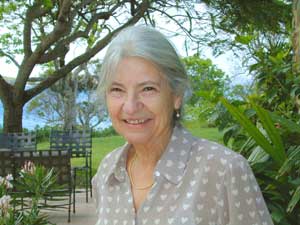|
HOME | SEARCH | ARCHIVE |
|
Prominent researcher to head CITRIS efforts
Ruzena Bajcsy has passion to improve lives through new technology
![]()
By Sarah Yang, Public Affairs
| |  Ruzena Bajcsy will lead CITRIS, the new Berkeley-led initiative to bring the power of information technology to bear on urgent societal problems. |
10 October 2001
|
For pioneering researcher Ruzena Bajcsy, fostering cutting-edge technology to improve people’s lives is a noble challenge. It is with this belief that Bajcsy comes to Berkeley on Nov. 1 as the new director of CITRIS, the Center for Information Technology Research in the Interest of Society. CITRIS brings together four UC campuses — Berkeley, Davis, Merced and Santa Cruz — with private industry in an ambitious initiative to develop innovative technology that tackles some of society’s most pressing problems. It is one of four California Institutes for Science and Innovation born out of Gov. Gray Davis’ call to develop the foundation for the next generation of technologies. Bajcsy is the former head of the Directorate for Computer and Information Science and Engineering at the National Science Foundation, the federal agency that supports research in science and engineering. During her tenure at the NSF, Bajcsy helped establish the foundation’s Information Technology Research program, which funds innovative, high-impact research supporting infrastructure in information technology. Initiatives at CITRIS include the development of a wireless network of tiny, cheap sensors that could monitor energy use in a building to help save electricity. Sensors could also be used in traffic monitoring systems to save fuel otherwise wasted in congestion. People at risk for heart attacks could wear sensors that could save lives by signaling emergency personnel should a health problem occur. “CITRIS is more than just developing new technology for its own sake,” said Paul Gray, executive vice chancellor and provost. “The projects that go on in the institute will be a marriage of important applications, from the delivery of health care to developing systems of climate monitoring.” CITRIS received $20 million in state funding this fiscal year, the first of four installments of a $100 million state commitment to the overall project. “We’re fortunate to be able to attract someone of Ruzena’s expertise and experience,” said Richard Newton, dean of the College of Engineering. “For a project of this size and scope, we really needed a leader with an international reputation and with extensive management experience, but the most important thing about Ruzena is that she is absolutely passionate about what we’re going to do in CITRIS.” Bajcsy’s credentials reach across the traditionally discrete fields of neuroscience, applied mechanics and computer science. She is a member of both the National Academy of Engineering and the Institute of Medicine, a distinction few people can match. “I studied biology and psychology because the best machine is the human machine. After all, modern evolution is the best engineer you can imagine,” said Bajcsy. Understanding the needs of researchers in varying fields has helped Bajcsy develop a strong track record for building interdisciplinary consensus, a key skill needed in a CITRIS director, said Newton. As director, Bajcsy will be responsible for setting the research agenda at CITRIS and communicating the center’s vision to the general public, legislators and private industry. “She has demonstrated a real flair for synthesizing the views of many different people with different backgrounds and expertise, and getting them to work together productively,” said Katz. “This skill will serve her very well within the broad community of researchers that encompass CITRIS.”
“The vision of where information technology research has to go as articulated in that (NSF) program is exactly what we’re doing at CITRIS. We’re taking information technology and using it in a way that affects people in their daily lives,” said Randy Katz, professor of electrical engineering and computer science at Berkeley. Katz had been serving as interim director of CITRIS during the center’s initial conceptual and organizational phases.
Bajcsy is a top scientist in her own right with more than 40 years of research experience, most notably in the fields of robotics, artificial intelligence and machine perception. At the University of Pennsylvania, Bajcsy served as director of the General Robotics and Active Sensory Perception Laboratory, a world-renowned research lab she founded in 1978.
Home | Search | Archive | About | Contact | More News
Copyright 2000, The Regents of the University of California.
Produced and maintained by the Office of Public Affairs at UC Berkeley.
Comments? E-mail berkeleyan@pa.urel.berkeley.edu.